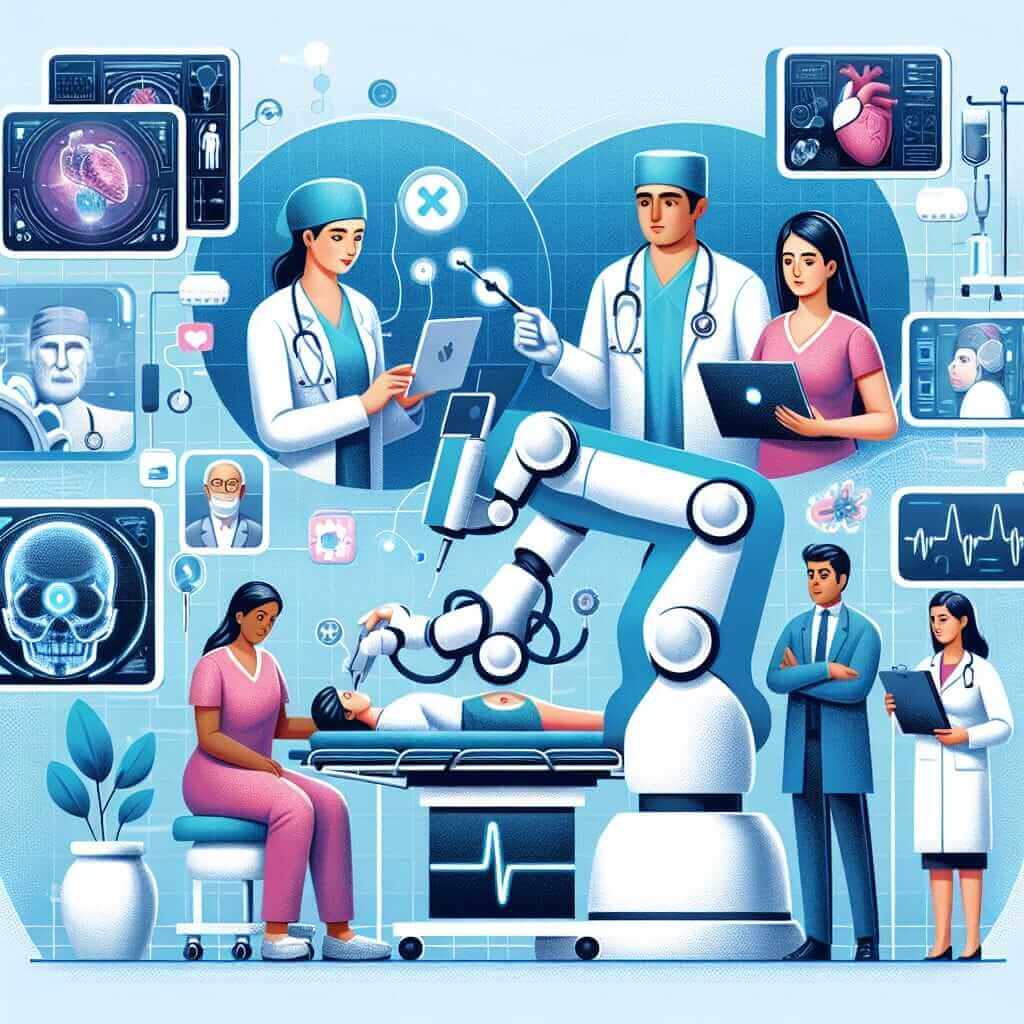Introduction
The IELTS Reading section is designed to assess a candidate’s reading skills through various types of questions based on real-world texts. Topics covering technology’s impact on various fields, including healthcare, are common and important. This article focuses on the topic “How is AI transforming the global healthcare landscape?” which has gained significant popularity and relevance recently. Given this trend, it is likely that similar texts could appear in future IELTS exams.
Allen, G. (2022) found that the application of Artificial Intelligence (AI) in healthcare is a growing research area, which reflects the rapid advances in this field globally. We believe that understanding how AI is making revolutionary changes in healthcare will not only enhance your general knowledge but also prepare you for potential reading passages in the IELTS exam.
The Reading Passage
AI in Healthcare: Changing the Global Landscape
Artificial Intelligence (AI) is revolutionizing many industries, and healthcare is no exception. With the rapid advancement in technology, AI is transforming healthcare profoundly, leading to better patient outcomes, cost efficiency, and overall enhancement in healthcare services.
AI’s capabilities to analyze vast amounts of data quickly have paved the way for innovations like predictive analytics, personalized medicine, and automated diagnostic tools. For instance, Machine Learning (ML) algorithms are used for early detection of diseases such as cancer and diabetes by analyzing patient data and medical images. This leads to earlier interventions and better survival rates.

Furthermore, AI-driven systems can significantly reduce the workload of healthcare professionals by automating administrative tasks such as scheduling, managing medical records, and even prescribing medications based on diagnostic data. This allows doctors and nurses to focus more on patient care.
Healthcare chatbots powered by Natural Language Processing (NLP) are also improving patient engagement by providing 24/7 access to medical advice and appointment scheduling. These chatbots use AI to understand and respond to patient inquiries, ensuring timely and accurate information dissemination.
Despite its benefits, the integration of AI in healthcare also poses challenges. Privacy concerns, the need for substantial data to train AI systems, and the disparity in technology adoption across different regions are notable challenges. Ensuring ethical AI practices and addressing these challenges will be crucial for the sustainable and equitable growth of AI in global healthcare.
Practice Questions
Questions 1-5: True/False/Not Given
Identify whether the following statements are True, False, or Not Given.
- AI has completely eliminated the need for human doctors.
- Machine Learning algorithms are used for early detection of diseases.
- AI-driven systems can only be used in administrative healthcare tasks.
- AI can enhance patient engagement through healthcare chatbots.
- Ensuring ethical AI practices is crucial for the growth of AI in healthcare.
Questions 6-10: Matching Headings
Choose the correct heading for each section.
A. Automation of Healthcare Administration
B. The Challenges of AI Integration
C. Predictive Analytics in Medicine
D. Benefits of AI in Patient Care
E. The Role of Chatbots in Healthcare
- Paragraph 1
- Paragraph 2
- Paragraph 3
- Paragraph 4
- Paragraph 5
Answers
Questions 1-5:
- False – AI has advanced but not completely replaced human doctors.
- True – Machine Learning algorithms detect diseases like cancer and diabetes early.
- False – AI is used in both administrative tasks and patient care.
- True – Healthcare chatbots enhance patient engagement.
- True – Ethical AI practices are essential for sustainable growth.
Questions 6-10:
- D – Benefits of AI in Patient Care
- C – Predictive Analytics in Medicine
- A – Automation of Healthcare Administration
- E – The Role of Chatbots in Healthcare
- B – The Challenges of AI Integration
Common Mistakes in Reading Section
- Misinterpreting the text: Ensure you understand the context and specifics before answering True/False/Not Given questions.
- Ignoring specific details: Pay attention to small details that could affect the meaning of the statement.
- Matching incorrectly: Carefully read the sections to match the correct headings to avoid logical errors.
Vocabulary Enhancement
- Revolutionizing (v): /ˌrevəˈluːʃəˌnaɪzɪŋ/: Transforming significantly or completely.
- Predictive Analytics (n): /prɪˈdɪktɪv əˈnælɪtɪks/: Analysis to predict future events based on data.
- Personalized Medicine (n): /ˈpɜr.sən.əl.aɪzd ˈmɛd.ɪ.sən/: Medical treatments tailored to individual patients.
- Natural Language Processing (n): /ˈnæʧərəl ˈlæŋɡwɪdʒ ˈprɑsɛsɪŋ/: A branch of AI that deals with the interaction between computers and humans using the natural language.
Grammar Focus
- Relative Clauses: Used to add extra information about a noun.
- “AI, which is advancing rapidly, is transforming healthcare.”
- Passive Voice: Emphasizes the action rather than the subject.
- “AI-driven systems are being implemented in healthcare.”
Tips for High Reading Scores
- Practice regularly: Regular reading practice with a variety of texts enhances comprehension.
- Skim and scan: Quickly identify the main ideas and specific information.
- Expand vocabulary: Improve your understanding and ability to infer meanings.
By focusing on these strategies and frequently practicing with high-quality reading materials, you can significantly enhance your IELTS reading performance and achieve a higher score.